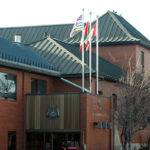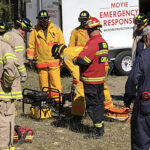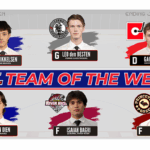Home »

Suzuki: The Elder
Canada’s greatest known scientist takes off the gloves
His wisdom and intense love of the world’s natural processes have always defined Dr. David Suzuki.
His efforts to educate helped spawn environmental awareness in Canadian generations spiraling from the 1970s, as he blended old world contemplation with the grounded, reasoned calm of a scientist on Nature of Things and other television shows.
He has influenced the powerful and continues to possess the captivating charms of a new world wizard, even at a startlingly spry 76 years of age.
If that wasn’t cool enough or if that doesn’t seem like enough of a lifetime achievement for you, fear not.
For Suzuki is now an elder.
And like someone who knows he doesn’t want or need any further acclaim and doesn’t care about the myriad of political cautions one can become entangled in, he is speaking his mind like never before.

Politics be damned; sensitivities be damned. David Suzuki has seen and heard enough and as the world reaches the 50th anniversary of the birth of environmentalism, with the release of Rachel Carson’s Silent Spring in 1962, it is time to start asking some serious and pointed questions and to contemplate the paradigm shift humankind needs to make if it has a chance at survival.
“My message now is a very urgent one. And that is we are on a collision course with the very things that keep us alive,” he said during a quiet interview in Invermere’s Living Lakes office, a couple of hours before he addressed a jam-packed Invermere Community Hall June 1, as part of Wildsight’s 25th anniversary celebrations.
“And it is being done because the economy has subordinated everything else. We failed to recognize that the very word economy comes from the same word as ecology – ecos – the Greek word for household or domain. And we’ve elevated the economy above ecology among the principles of sustainability. And I think that’s the threat – we’ve become the most populous and numerous animal on the planet. And with our technology and consumption and global economy we’ve become, I call it, a force of nature. We’re altering the chemical and physical and biological features of the planet and no other species in four billion years has ever done that.
“And we are not asking the most important question and that is what is an economy for? We’re among the richest countries on the planet and we’re not willing to cut back? We blame China for the greenhouse gas emissions and we’re not willing to cut back. It’s suicidal! And that’s my message.”
Speaking to local media and later to a full community hall crowd, with people

from all over the region as well as Alberta joining Wildsight Invermere members and valley residents in hearing this Canadian legend speaking his mind, Suzuki didn’t hold back or pull any punches.
From Prime Minister Stephen Harper to pesticides to the blatantly obvious sticky wickets of the egocentric flaws of democracy and free enterprise, to other nasty and weedy subjects, Suzuki unloaded his guns, all the while rarely straying from his usual balance of sounding the alarm but with a reasoned and slightly optimistic tone. Even the environmental movement itself is feeling his ire.
When asked if he’s growing frustrated with having to repeat the same messages for decades now, Suzuki said, “The thing that is frustrating to me is we are now fighting the dam at Site C on the Peace River and we won that one 30 years ago and we’re fighting it again. We’re fighting against the proposal to drill for oil off of Hecate Straight. We won that one 35 years ago, but we’re fighting it again. And that to me is a signal of the fundamental failure of the environmental movement. We’re very good at getting new departments of the environment and laws to protect air, water and soil and all that stuff; endangered species and we’ve got parks but we haven’t changed the mind-shift away from thinking we’re the centre of the action. Everything is about me. My economy is the most important thing and nature has got to be fit into my economy because I am not giving up on MY economy. Well, you can’t change nature, but you can change the economy. That’s a human construct.
“And it’s very frustrating that after 50 years – this is the 50th anniversary of the environmental movement – so after 50 years of huge change and you know, of successes, we haven’t changed the way we look at the world. Rachel Carson’s message was that we are part of nature and everything is connected to everything else and she focused on pesticides. She said, ‘look, you spray on a field and kill bugs but because everything is connected you end up affecting the fish, birds and women. And we haven’t even got that message after 50 years. We haven’t really understood that whatever we do affects everything else,” he said, adding that he is more sad than frustrated with the apparent human inclination to disregard the obvious.
Suzuki said he recognizes the fact he is only one person and he himself cannot change the world. But a prevailing sadness gnaws at him.
“It is the mindset that is destroying the world,” he said.
With Rachel Carson in mind along with the B.C. government’s recently released committee report that notes pesticides serve a purpose, e-KNOW asked Dr. Suzuki his take on pesticides.
Without hesitating, he growled, “Pesticides are the dumbest things I can imagine. The most important group of organisms on the planet are insects. They are the most diverse, they’re just a very important group of organisms. So we think that because one or two out of every thousand species of insects are a pest to us – we spray chemicals. They kill all of them! And then we think, ‘oh well, they’re bugs. It’s not going to affect us. I mean, this is the dumbest thing I can imagine. And yet after 50 years of Rachel Carson’s book we are still arguing about ‘can’t I be allowed to spray flowers in my garden?’ No bloody way you should be allowed. You shouldn’t be doing it on farmers’ fields!”
Suzuki said is disappointed in the Christy Clark government, noting that five days after she assumed power she visited his office.
“She was very open and very interested and engaged and I thought, ‘well that’s great.’ She was committing herself to families and children and we had a lot to say about that. But I can see in the last three or four months she has really stiffened up and it’s clearly a Harper-driven agenda now. I know she’s hired someone from Harper’s office and she’s coming out with a much harder line.”
As for Canada’s current Prime Minister, Suzuki was clear. “The biggest challenge we face is we have to get rid of this government in Ottawa,” he exclaimed, earning a loud cheer near the end of his June 1 public presentation, which he did for free. Suzuki, a friend of Invermere Wildsight manager Juri Peepre, agreed to speak gratis after being invited to visit the valley by his friend.
Suzuki continues to wonder why humankind is so bent on consumption and why it is so keenly and blatantly ignoring the warnings of the science community.
“We’ve elevated the economy as if it is everything. Before we do anything about the environment, we’ve got to make sure the economy is growing and healthy. The question then, to me, is well, how much is enough? Do you want to keep growing forever? It’s impossible. This is stupid. How much is enough? Do we need more stuff to be happier? At the same we’re wrecking our surroundings. It doesn’t make sense to me. But because we are stuck on this idea that growth is the definition of how well we do… you ask Mr. Harper, you ask any businessman ‘how well have you done last year,’ he’ll immediately say their business or the GDP grew. But growth is just the description of a system. Growth by itself doesn’t do a bloody thing. And it depends on what’s growing… what is it doing for us? But we’ve come to think that growth is the very definition of progress. And this is suicidal.
“We are already one of the richest countries in the world. I was born in 1936 and I can tell you when I was born life was a hell of a lot different from what it is now. And I’m not convinced that all of the economic growth that has happened since I was born has made my life any better. Oh, we’ve got a lot of gadgets and stuff – that’s what the economy does really well. But in terms of the things that keep me alive and happy – that is ‘what’s the water like?’ My parents would never have dreamt that people in Canada , which has more fresh water than any other country on the planet, would pay more for bottled water than they pay for gasoline. What’s going on, you know? And what about the air? We use air as a garbage can. And we don’t want to pay anything to put that garbage in there. What about the soil? Well, industrial agriculture has destroyed the soil. With all of this economic growth, is life better for Canadians? I would say it is not so why are we so committed to growth?”
Suzuki said he recently returned from Japan and noted its economy hasn’t grown in 20 years. “They haven’t fallen off the edge of the world. They look every bit as wealthy as we do now. I don’t get it. Growth has become, somehow, the touchstone that we are all aiming at. We’re focused on the wrong thing. We should be asking what is an economy for? Are people happier? And I think that what’s happening in Montreal today, with the students, is far more profound that just a tuition increase.”
He wonders “what the heck is our government’s priorities?”
Students’ tuition will rise, impacting the potential for a better educated nation yet corporations get government handouts. “I think it’s a profound thing, as was the Occupy Movement.”
The free enterprise system employed in Canada is “fundamentally flawed,” Suzuki charges. “You would never fund anyone who says they are going to build a perpetual motion machine. You know the laws of physics determine that entropy is going to happen. You cannot build a perpetual motion machine and yet we think this thing that we created called the economy, based on free enterprise, can grow forever. It can’t!” he exclaimed.
“And anybody who thinks they can go and extend beyond the biosphere and mine asteroids and the moon – when you look at the resources and the energy it is going to take just to get there , let alone mine it and bring it back, forget it! I mean, this is crazy! It’s crazy to think that that’s possible… so we’ve got to design an economy that is based on a finite world that is not filled with infinite resources. When we burn oil we burn a gift from our ancestors millions of years old. One time and that’s it! If you look at oil or the Tar Sands – unbelievably rich mix of macromolecules that were created over millions of years by life. They are the remnants of life and this why our whole plastics industry, all the chemical industries, built on oil and held as a resource and we just burn it! I mean, this is nuts! When you burn it, that’s it forever. There will never be oil like that again. And it’s a huge, rich mix of molecules that I think are wasted.”
Suzuki said he’s been to the Alberta Oil Sands “many times” and “right now it’s not sustainable, at all. My position on this is ‘hey, wait a minute, I thought I lived in a Parliamentary democracy?’ In a Parliamentary democracy, the way I learned in high school – mind you I went to high school in the Jurassic age in the 1950s, but when I was in high school they taught me ‘we don’t elect prime ministers, we elect parties. The parties elect the leader who will become prime minister and what they do is develop a platform and we vote for the party based on the platform and when we elect them they have a mandate to enact the platform. I don’t think it’s changed, has it? The mandate is the platform, which we discuss before an election. I have never heard of an election based on ‘what should we do with the Tar Sands?’ This is the biggest development on the planet. You can see it from outer space. We’ve never had a public discussion about it. And yet it’s full tilt because Mr. Harper has a mandate – a majority. We never gave him a mandate to develop the Tar Sands. It wasn’t on the agenda. He now claims that Canada is a ‘petro super-state.’
“Well, I happen to think that is a dangerous thing, when you develop an economy built on a single resource. I can show you … you can go through British Columbia from Port Alberni… to… there are all kind of communities built on logging, mining or fish. When the resource collapses, when the market collapses you’ve got a ghost town. And yet we want to develop our economy based on a single resource? This is crazy.”
Suzuki’s exasperation is palpable. “I am tired of fighting,” he declared. “And the reality is that we can’t afford to have losers any more. We’re talking about the future for young people. Their whole lives are going to be spent in the world that we decide to leave them. So we’ve got to make some important decisions and begin a discussion about what are our priorities.”
He admits he’s spent a great deal of time involved in round-table discussions about environmental issues “where stakeholders come,” he said, making animated quotations with his fingers, “and we argue about what to do with the forest and the river. This is crazy because the people come from entrenched positions and they protect their own vested interests. And they argue and they fight and you end up compromising. So I want to start it in a different way. I want to get together and say, ‘what can we agree on?’ So how about this as a suggestion? We’re animals. If you don’t have air for more than three minutes, you’re dead, or you’re brain dead. If you have polluted air, you’re sick. So I would have thought the most important priority we have in LIFE is air. And you don’t mess with air. Now if we can’t start with a discussion all agreeing at that then we’re never going to.
“If you don’t have water for more than three or four days you’re dead. If you have polluted water you’re sick. If you don’t have food for a few weeks you’re dead, so go through ‘what are the fundamental things that we as animals need?’ It’s clean air, clean water, clean soil, clean energy that comes from the sun and a diverse array of plants and animals that gives us the air, the water, the sunlight and then we build from there. If we can’t agree that those are the most basic needs, long before we have economics, politics, anything – those are our most fundamental biological needs. And then we build and say, ‘okay, we’re social animals, and we’re spiritual beings – I’m not talking about religion but spirit – then that to be becomes the foundation of our discussion. Once you say ‘these are the most basic needs’ – biological, social and spiritual needs that must be protected above anything. Then as humans, how do we build an economy?”
Suzuki, who has stepped away from the David Suzuki Foundation, said he’s given up on international meetings, citing failures such as Copenhagen, where “192 agendas” were unfurled from each participating nation.
“We end up trying to shoehorn nature into a human construct,” he said, but the reality remains it has got to be dealt with, he added.
Carbon levels in the Arctic are already past the point where scientists warned the Earth could not rebound, he shrugged.
Despite obvious views about the current federal government and provincial government, Suzuki said he doesn’t believe tug-of-war between environmentalists and industrialists is being held along the political spectrum.
“I’ve talked to Preston Manning a lot and he agrees with me on virtually everything. He’s a rabid environmentalist. I was shocked that he loves camping!” he said, offering an example of a right winger who embraces the environment.
That said, devotees “of the market” continue to push agendas that are harmful to the biosphere.
“What the hell… the market is something we invented for Christ’s sake!” Suzuki fumed. “It’s not a force of nature and yet we think somehow, just let the free market do everything and everything will be. This is bullshit. This market… this economy… “ he spat.
Suzuki shared a story of becoming involved in a fight against logging the Stein Valley near Lytton and how he came upon the president of Fletcher-Challenge, the New Zealand company seeking to log the valley while leaving the area after camping in it. The company president was hiking in with a well-dressed party.
“He realized, holy shit, this is that shit disturber David Suzuki! We get into a heated discussion which turned into a screaming match. Anyway, he finally said, ‘listen,’ and this is key, ‘are tree huggers like you going to pay to protect those trees? Because if you’re not willing to pay for those trees they don’t have any value until someone cuts them down. And that was a huge epiphany for me because I realized in that moment that’s the problem. He’s absolutely right. The trees, as long as they are standing, are taking carbon dioxide out of the air and putting oxygen back in it. It keeps the planet habitable for an animal like us. Economists regard that as an externality. It’s not in the equation,” Suzuki explained.
“The forest, as long as it is standing, is performing what are called ecosystem services – things that keep the planet healthy for an animal like us and yet economists disregard them as irrelevant. It’s all got to be argued in those concrete economic terms. The REAL importance of the forest , which is to keep the biosphere healthy is not in the economic equation,” he said.
Suzuki uses a chilling analogy to describe the precarious, precious nature of the Earth’s biosphere, describing it as a single sheet of Saran Wrap covering a basketball. “It’s that thin! So the economic system, no matter how enlightened people are, is inevitably destructive.”
He marvels at the fact that polluters of the Earth’s air get away with it, while those who pollute rivers are fined and other less damaging actions are also punished.
One of the clear tipping points for mankind’s failure with the environment began during the Great Depression, Suzuki pointed out, explaining that Franklin Roosevelt’s administration outlined a plan to encourage consumption among Americans as a way to bolster the economy.
“And it worked. Seventy percent of the economy in North America is based on consumption,” he said. “Very little of it is necessities, as my parents taught me. And we’ve set the standard, because we’re not showing any sign of giving up on it.”
Canada’s failure to show leadership following the Kyoto agreement is an example of this nation’s hypocrisy, Suzuki said, and explains why the status quo remains.
“If we aren’t willing to cap and begin to reduce our emissions, why should the Chinese or the Indians or Brazilians or Indonesians pay any attention to us? It doesn’t make any sense. So we have a huge responsibility to show leadership.”
Suzuki said he can speak freely now because he’s “free. I am speaking now on issues as an elder. As an elder I don’t have the pressures of wanting more fame or money or power. I feel this is the most important time in any person’s life. You’ve lived a full life. You have experiences, you’ve had successes, you’ve had failures, you’ve learned by the end of your life what really matters in life. And my responsibility is to mind my life, to try to pass something I’ve learned from my failures and successes to the next generation. I try to spend as much time as I can with my grandchildren. That’s my great joy in life, but I feel bound now when governments or corporations are doing something that I think is wrong. I want to be able to be free to speak out and I want to be able to say, ‘Mr. Harper is doing the wrong thing. And I couldn’t in the past because whenever I did that my foundation got slammed and threatened with losing its charitable status.”
Suzuki said he believes he has the energy remain for one last “big project. What I want to do is just start a conversation. And I want to ask Canadians the question I don’t think our politicians are asking and it’s the most important thing: why do you live in Invermere and not in Vancouver or Toronto? Why are you living in this place on the planet? What is it you like here? What is it that you are proud of to be Canadian? And what would you like Canada to be, or Invermere to be 30 years from now, when your children might be having children? Nobody is asking that question. Politicians’ sole focus when they are elected is the next election. Their highest priority is getting re-elected. So they’re not looking beyond three or four years. Corporations – their agenda’s driven by the quarterly report. Nobody is asking the big question about where are we going?”
He points at Kelowna as an area that should have held such a discussion.
“Thirty three years ago if you asked people in Kelowna ‘would you like to have your city three times as bigger with polluted air and traffic jams – nobody would have said ‘yeah, that’s what I want.’ And yet because we didn’t think far along that’s what they got. And that’s what I feel we’re doing all across the country,” he said.
“I would love to just go in and talk to people about the bigger picture,” he said.
“I am absolutely sure that most Canadians’ great pride being Canadian is not because we have a balanced budget. It’s about that we used to be proud – that Canadians wore the blue hat that was the UN Peacekeepers; we thought of ourselves in that way, that we had CIDA and IDRC and these programs where we helped people in other countries; that’s what Canadians are proud of. But nobody is talking about that. It is all the economy, the economy, the economy. And even the economy discussion is bad economics.
“Mr. Harper tells us we can’t afford to do anything about greenhouse gas emissions and yet every study that I have seen says if we don’t do something about it, it’ll destroy the economy. But it’s because he’s not looking farther down the road.”
Suzuki said he has “tried several times” to meet and speak with the prime minister. “I think part of it may be because I told him off 10 or 15 years ago when I met him in Parliament. He was being interviewed and they asked him about global warming and he just said ‘nah it’s not a problem and we can’t afford to do anything anyway. I said ‘you don’t know what you’re talking about.’ Mr. Harper is a very vindictive man. He never forgets, so he’s refused to see me. I’m ready to talk to him, but…” he tailed off.
Now that the prime minister has a majority government, Suzuki said, “it is very clear where he is going. He doesn’t believe in the democratic process. He’s putting things in place… like nobody ever talked about gutting the environmental laws during the election. He’s going to gut the environmental laws in order to service the economic growth sector. The ‘Robo-calls’ – to me – if they turn out to be true and I think there’s a good chance it is – this is an attempt to undermine the very heart of what a (democracy) is. You are preventing people from voting. This is fascism and when you look at what he has done, he doesn’t want to be ruled by facts. Every person I’ve talked to in the law area is crime rates in Canada are falling. Why would anybody want to expand the prison system? Every law enforcement person I’ve talked to has said that the gun registry works and yet he’s abandoned that.
“What is the best way to know the state of Canada? It’s the long form census. He’s abandoned that. He’s canceled research vessels in the Arctic looking at climate change. He canceled the experimental lakes area – the world renowned research area on lakes. He doesn’t approve of safe injection sites – all the evidence is it saves lives. So it’s clear he doesn’t want to be bound by facts.”
Suzuki said he believes small business is the heart of the Canadian economy and questions why Harper’s Conservative government snubs it in order to provide “welfare” for the most profitable major corporations.
“How can companies that are more profitable than they’ve ever been be subsidized by the taxpayer? And then the government says we can’t do the things that we need for the small business person or for public transit or all the things that we need to do. It just doesn’t make sense to me,” he stated.
Suzuki said he is “shocked” by the announcement in the recent federal budget that Canadians returning from the United States can now bring $800 in goods back, after a 48 hour visit, as opposed to $400 a person prior to June 1.
“You think that’s going to help the small business owner in the border areas? Hell no! I mean, it’s nuts!” he exclaimed.
Canada needs more democracy and civil involvement, Suzuki continued.
“And we need to return to a truly Parliamentary democracy. Tell us what you are going to do when you are elected!”
Harper’s control of Ottawa is disturbing, Suzuki said.
“I mean, your guy (Kootenay-Columbia MP David Wilks) got slapped down so quick (for admitting concerns about the budget). This is amazing. Harper has just taken control.”
Suzuki said he wants people to consider him as more than an environmentalist.
“I am concerned about the environment, but I am also concerned about social justice; I am concerned about hunger and poverty; and I am concerned about civil society. I want more democracy and we getting less and less of it,” he said. “There are many of my colleagues now who believe we are past the tipping point – that it is too late. That we won’t be able to re-bound, if we finally decide to pull back. I agree with all of their analyses of the situation but my own feeling is it doesn’t help to say it is too late. That even if it were the last moment, if we care about our kids and grandchildren we’re going to fight right to the end. It doesn’t help to say it is too late. It helps to say it is very, very urgent. We can’t piss around anymore.”
Despite so many concerns, Suzuki still presents his well-known optimism.
He loves speaking with kids, especially those “who are trying to make a difference. It’s important to empower them,” he said, relating a story of how he met with 20 kids in Invermere earlier that day.
“There was one boy. That’s interesting,” he pointed out. “But they were pumped and they said ‘what can we do?’ I said, ‘look, the reality is a politician has got to be concerned about the people who vote in the next election; children don’t vote. So they’re not stupid or evil, it’s just the reality of the game. So your job, if you don’t agree with what is going on is to talk to Mom and Dad, the two most important people on the planet. And they’ve got to be warriors on your behalf. Boy they were pumped!”
While he has clearly expressed views on Canada’s current political landscape, Suzuki said he doesn’t entertain the notion of entering that arena.
“If I was 20 years younger, I might, but… I could never… I mean, I take my hat off to anyone who wants to run for politics,” he said, noting he respects the time and travel involved for those in federal politics. They also sacrifice much time away from loved ones. “That’s a huge price to pay,” he said. “I could never do that.”
Ian Cobb/e-KNOW








